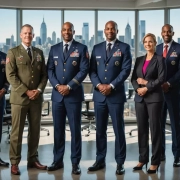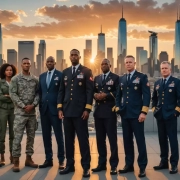Unlocking Civilian Success: How Career Coaching Empowers Australian Veterans
Navigating the transition from military to civilian life is a significant challenge faced by many Australian Defence Force (ADF) veterans. The skills honed in the military are unique and valuable, yet translating these into a civilian context can be daunting. This is where career coaching becomes a pivotal tool, offering veterans the guidance needed to transform their military skills into civilian success.
Understanding the nuances of the civilian job market is often the first hurdle. Veterans are accustomed to a structured environment with its own language and expectations. Career coaching provides a bridge, helping veterans decode industry-specific jargon and align their skills with roles that suit their interests. For instance, leadership and teamwork, which are integral to military service, are equally sought after in civilian industries. By recognising how these skills apply to civilian roles, veterans can position themselves as strong candidates.
Crafting a compelling CV and cover letter is another critical step in the transition process. Many veterans struggle with translating military jargon into language that resonates with civilian employers. Career coaches offer personalised guidance in highlighting military experience effectively, ensuring that key achievements and skills align with job descriptions. A well-crafted CV and cover letter can significantly enhance a veteran’s chances of securing an interview.
The interview process itself can be intimidating, especially for those who have not participated in one for years. Career coaching equips veterans with the tools to excel in interviews through mock sessions and constructive feedback. Coaches teach veterans how to articulate their skills and experiences confidently, preparing them for common interview questions and boosting their confidence.
Networking is a vital component of job searching, yet it can be unfamiliar territory for many veterans. Career coaching emphasises the importance of building a professional network and guides veterans on how to connect with industry professionals. By leveraging platforms like LinkedIn, veterans can access job opportunities that may not be publicly advertised. Building relationships within their desired field increases the likelihood of finding the right job.
Setting realistic career goals is essential for a smooth transition to civilian life. Career coaching helps veterans define what success looks like for them, setting achievable short-term and long-term goals. Coaches provide strategies to overcome potential obstacles, ensuring veterans remain motivated and focused throughout their journey.
While technical skills are crucial, soft skills such as communication, adaptability, and problem-solving are equally important in the civilian job market. Career coaching focuses on enhancing these skills, offering exercises and feedback to help veterans develop a well-rounded skill set. This preparation ensures veterans are ready for any role they pursue.
The journey from military to civilian life does not end with landing a job. Continuous support and resources are vital for long-term success. Career coaching offers ongoing guidance as veterans navigate their new roles and career paths, providing access to workshops, seminars, and networking events to keep them informed and connected.
For those interested in exploring how career coaching can facilitate this transition, Ironside Resources offers valuable insights. Their blog post, How Career Coaching For Veterans Transforms Military Skills Into Civilian Success, delves deeper into the strategies and benefits of career coaching for veterans. It complements the discussion here by highlighting practical steps veterans can take to achieve civilian success.
To further support veterans in their transition, the Australian Department of Veterans’ Affairs provides a wealth of resources and support services. Their website offers additional information and tools to assist veterans in navigating the complexities of civilian employment. By utilising these resources, veterans can enhance their career prospects and achieve their professional goals.

 Entrepreneur Network Australia
Entrepreneur Network Australia



